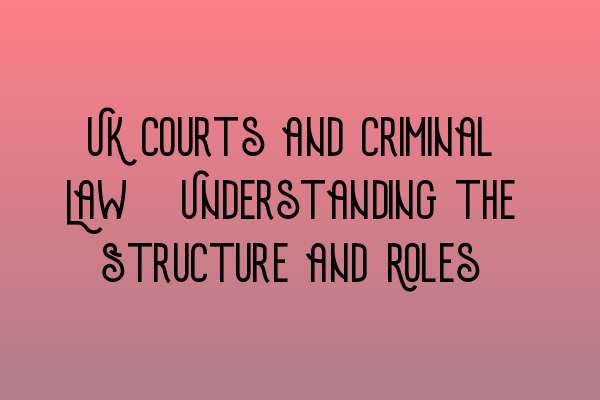UK Courts and Criminal Law: Understanding the Structure and Roles
In the United Kingdom, the court system plays a crucial role in administering justice and upholding the rule of law. Understanding the structure and roles of the UK courts in relation to criminal law is essential for anyone involved in the legal profession or facing criminal charges. In this article, we will delve into the intricacies of the UK court system and explore the various roles it encompasses.
The UK Court System
The UK court system is hierarchical, with each court having its own jurisdiction and powers. The structure can be broadly categorized into two main branches: the criminal courts and the civil courts. For the purpose of this article, we will focus on the criminal courts.
Magistrates’ Court
The Magistrates’ Court is the lower court in the UK criminal justice system. It deals with less serious criminal offenses, such as minor assaults, theft, and traffic offenses. Cases in Magistrates’ Court are typically presided over by a single magistrate or a panel of three magistrates, known as lay magistrates, who are appointed from the local community.
Magistrates’ Court also acts as an initial venue for more serious offenses before they are transferred to the higher courts, such as the Crown Court. The role of the Magistrates’ Court is to determine whether there is enough evidence to proceed with a trial and, if necessary, set bail conditions for the accused.
Crown Court
The Crown Court is the next level in the UK court system for criminal cases. It deals with more serious offenses, such as murder, rape, and drug trafficking. Unlike the Magistrates’ Court, the Crown Court has a jury consisting of 12 members who are responsible for determining the guilt or innocence of the accused based on the evidence presented.
A judge presides over the proceedings in the Crown Court and provides guidance to the jury on matters of law. The judge also has the authority to pass sentences if the accused is found guilty.
High Court
The High Court is the highest court in England and Wales, and it has both civil and criminal jurisdiction. In criminal matters, the High Court primarily deals with appeals from the Crown Court and handles cases with significant legal or constitutional importance.
The High Court is divided into three main divisions: the Queen’s Bench Division, the Chancery Division, and the Family Division. Each division has its own specialization and handles specific types of cases. The judges in the High Court are referred to as High Court Judges.
Supreme Court
The Supreme Court serves as the final appellate court in the UK. It hears appeals from all legal jurisdictions, including criminal cases, from the High Court and other lower courts in the UK.
Comprising of a panel of justices, the Supreme Court ensures consistency in the interpretation and application of the law. It plays a vital role in shaping legal principles and setting precedents that influence future rulings in criminal cases.
Understanding the Roles
Within the UK court system, various legal professionals play essential roles in the delivery of justice. These roles include:
- Solicitors: Solicitors are legal professionals who provide advice, handle legal documentation, and represent clients in court. They are the first point of contact for individuals seeking legal assistance and play a critical role in preparing cases and providing legal guidance throughout the criminal law process. Demystifying the Solicitors Qualifying Examination Format
- Barristers: Barristers specialize in courtroom advocacy and provide expert advice on legal matters. They are typically called upon by solicitors to represent clients in higher courts, such as the Crown Court and the High Court. Barristers have in-depth knowledge of the law and play a crucial role in presenting legal arguments and examining witnesses in criminal trials.
- Judges: Judges are legal professionals who preside over court proceedings, ensuring that trials are conducted fairly and in accordance with the law. They provide guidance to the jury and pass sentences when necessary. Judges in the UK court system are highly respected and independent individuals responsible for upholding the principles of justice.
Conclusion
Understanding the structure and roles of the UK courts in relation to criminal law is essential for anyone involved in the legal profession or facing criminal charges. From the lower Magistrates’ Court to the higher Crown Court, High Court, and Supreme Court, each court serves a specific purpose within the criminal justice system.
Legal professionals, such as solicitors, barristers, and judges, play vital roles in ensuring that justice is upheld. It is through their expertise and dedication that the UK courts continue to maintain the highest standards of fairness and equity in criminal proceedings.
For more in-depth information on related topics, we recommend checking out the following articles:
- LLC Formation Made Simple: Step-by-Step Guide for UK Entrepreneurs
- Business Regulations in the UK: A Comprehensive Overview
- Preparing for the SQE Exam: Strategies and Resources for Success
- SQE Workshops and Webinars: Accelerate Your Exam Preparation
